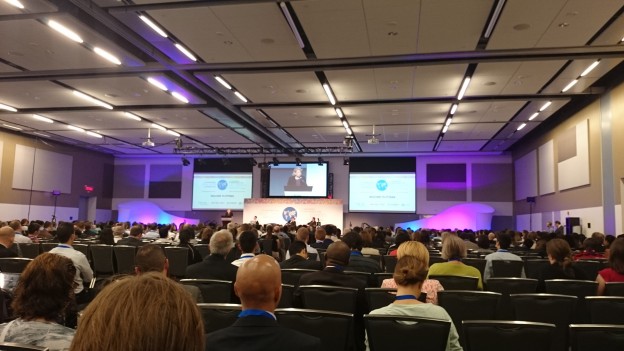By Suthee Sangiambut
The 2015 International Open Data Conference (IODC) opened today, May 29, at the Shaw Centre in Ottawa. Below, we detail the conclusions from several panel discussions on open cities.
In fact, open cities were the featured topics in two of the day’s panel sessions. While a number of case studies were given, panelists emphasized that few cities (less than 1%) globally have adopted any type of open city initiative.
However, the case studies demonstrated the potential for sensing and data analysis to be used to improve resource allocation and targeting in a city’s public services. A good example given was by Stephane Contre, the chief analytics officer for the City of Edmonton. In particular, he mentioned how hotspot mapping using a kernel density function was done on light bulb point data and on crime point data. This results in new layers representing point data with continuous surfaces. Such a representation allows officials to layer the light bulb, other hotspot data, and various crime data sets, identify correlations, and identify areas in need of additional resources or patrolling.
Not only was there a focus on the data side of open cities, there was also an emphasis on the need for citizen engagement. Without citizen engagement in an open city initiative, city residents simply become receivers of public services. Feedback loops that allow citizen input are needed to make sure city officials can adequately gauge and react to the demands of citizens.
Furthermore, big barriers to releasing open data still remain, especially in the organizational culture within government and due to the lack of political support. Additionally, civil servants require better computer and data literacy to bring about a ‘data first’ mindset where civil servants keep in mind the idea of openness as well as the possible analysis they could perform on a given data set.
Closing remarks were made by Sir Nigel Shadbolt of the Open Data Institute (ODI) and Tony Clement, president of the Treasury Board of Canada, who both expressed great optimism for the future of open data. According to Shadbolt, the next step for open data is in empowering individuals with their own data. He believes a mashing of open government data with personal data and even mobiles and wearable personal sensors will allow us to create even richer data driven experiences that improve quality of life.
Follow #IODC15 for rapid updates by attendees on conference activities.
If you have thoughts or questions about this article, get in touch with Suthee Sangiambut, Geothink’s Newsletter Editor, at suthee.sangiambut@mail.mcgill.ca.
